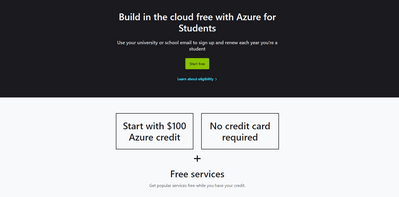Azure for students is a benefit availed to ongoing students whereby you get $100 worth of free credit to build and experiment with the cloud. As a student the credits are invaluable but how do you make sure you take advantage of the benefit, maximize it as well as reduce your spend? In this blog we will cover how you can optimize costs, use available services and tools to plan and monitor your spend. At the end, you will maximize efficiency while using the cloud.
Take advantage of free services available
There are over 25 free services you can use with your student subscription. To access all the free services available, go to Azure Education Hub.
Under the Azure free services, you will be able to check out all the services such as Virtual Machines, Static Web Apps, Azure Functions, Text to Speech and many more you can provision for free.
Plan your technical requirements using the Azure Pricing Calculator
As you set out to do a new project, one of the key things in planning is integral when you are using the cloud. The Azure Pricing Calculator enables you to accurately estimate your Cloud spend.
Scenario: For instance, if you would want to start on a Machine Learning project, you will need to utilize Azure Machine Learning service. On the pricing calculator select the service and customize the resource based on resource type, usage time as well as location. Once done, you will get an estimate of the service. If you require more services, you can add them to the estimate and finally you will be able to estimate the cost for the project.
Using Azure Policy to create limitations.
Azure policy helps you to enforce standards and is most useful when setting compliance rules. When it comes to setting price limitations, Azure Policy will be the perfect place to start. There are already built-in policy definitions for common use cases to help you get started. As you are pIanning your project, you can use Azure Policy to create limitations for the size or tiers for your resources. Learn how you can Configure Azure policy.
Efficiently making use of managed services to lower costs.
Let’s say you would like to deploy your portfolio website. You might want to deploy your application using a Virtual Machine (VM), which comes with the cost of administration such as maintaining the operating system and the underlying software. However, you don’t need to go the extra mile, you can use a managed service in our case the Azure Web App Service.
Monitor and Analyze your Spend using Cost Management
We have dived in on how you can plan and ensure the services you deploy are of a lower cost. How then do you monitor and analyze your spend? Microsoft Cost Management contains tools to help you plan, analyze and reduce your spending. Cost Management can be found on your homepage. Once selected, go to your subscription where you can view you expenditure.
Using cost management, you can analyze your costs by analyzing trends and through the Azure Advisor, you will receive recommendations on best practices. For example, I have just created an Azure Machine Learning Resource as well as a storage account. The cost overview will be as below:
Once I start utilizing the services for a project, it will give me a forecast of future expenses as shown below:
As it shows, the forecast indicates a usage of up to $80 by the next month. As a student, as you have only $100 dollars, this will mean your credits will be depleted before the end of the year. As a remedy, you can:
- Consult Azure Advisor on your dashboard to see any cost reducing strategies
- Create a budget and alerts to ensure that you do not deplete your credits
- Create additional policies to ensure you pick the most affordable options for different services
- Configure alerts based on your spending such as notifications when you reach a particular amount or based on your usage if you are likely to reach a particular threshold
- Constantly check and review your spending to aid you in decision making
- Finally, delete or pause resources you are not using, more on this expounded below.
_While using cost management, data might vary depending on the resource type hence some services will be updated earlier than others. As for cost and usage data in cost management it may take around 8-24 hours for them to fully reflect. _
Delete or pause resources when not in use to avoid unnecessary spending
Once you are done using any of your resources, ensure that they no longer use your credits by deleting all unused resources or pausing them. A great best practice here is creating a resource group for all your projects. In turn once you are done with the project you can just delete the entire resource group instead of deleting the resources one by one.
Summary and resources
This blog is aimed at ensuring that you use your Azure for Students benefits in such a way that it will maximize your benefit but reduce your spend. Curious to learn more on cost in the cloud? You can utilize the resources below:



























